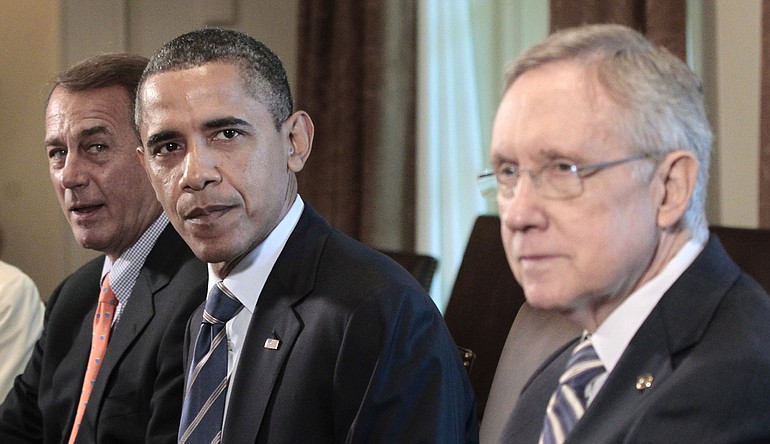WASHINGTON — A debt-busting deal on the scale that President Barack Obama and House Speaker John Boehner had talked about would have all but guaranteed that people on Medicare would feel at least some of the pain.
But on Saturday evening, Boehner said he wouldn’t seek the $4 trillion deficit reduction deal, but would seek $2 trillion in reductions.
The exact effects of that shift weren’t immediately clear.
Low-income people on Medicaid wouldn’t have escaped totally under a major deal, either. If a deal ultimately led to overhauling taxes, workers and their families could conceivably pay taxes on job-based health insurance.
Health care was a main ingredient on both the spending and tax sides of the agreement that Obama and Boehner, R-Ohio, had been trying to reach.
The president has scheduled a meeting today with congressional leaders to keep pushing for a compromise reducing future deficits in exchange for lifting the $14.3 trillion cap on the national debt. Action is needed so the government can keep paying its bills beyond Aug. 2.
With Congress politically polarized and skittish about next year’s elections, it’s unclear whether there’s any combination of Democratic and Republican votes that could pass major deficit reduction. Boehner’s shift suggested there was not.
But many of the health-care options that negotiators were considering have been available for months. Proposals have come from the Obama administration, congressional advisers and bipartisan groups, such as Obama’s debt commission.
Even a smaller deal may draw on many of those ideas.
Cuts considered
For Medicare, possibilities include higher premiums for upper-income retirees and new co-payments and deductibles that affect all but the poor. For example, seniors do not currently have a co-payment for home care. That could change.
A major proposal calls for changing the current cost-sharing rules, a hodgepodge of varying co-payments and deductibles, for Medicare.
Older people would have to shoulder more of the expense of routine care. Under one version of the proposal, all but the poor would have to pay at least $550 of their annual medical bills.
The idea is to make people think twice before they schedule that test or exam that probably doesn’t add a whole lot of information to what a doctor already knows.
But they would get a new benefit from the change. For the first time, Medicare would have an annual limit on out-of-pocket spending, protection against a catastrophic illness.
Further cuts to providers, including drug companies, hospitals, home health agencies and nursing homes also are possible. One proposal calls for seeking billions in rebates from drug companies for medications used by 9 million people covered under both Medicare and Medicaid.
Obama’s health care law already cut about $500 billion from projected payments to providers, and some experts say there’s not much fat left there.
Although Social Security had been considered untouchable, close to $200 billion could come in through a tweak that reduces benefits and increases collections on payroll taxes.
Advocates for the poor are concerned about possible cuts to Medicaid, a federal-state partnership that covers low-income children and parents, the disabled, and many nursing home residents.
The administration has proposed replacing an assortment of formulas for the federal share of the program with a single rate for each state. Officials say that could save $50 billion to $100 billion over 10 years, much of it in reduced administrative costs.
Governors are highly suspicious. They see a cut lurking behind the technicalities, and most believe the rate talk is budget-speak for dramatic cuts, said Washington Gov. Christine Gregoire, a Democrat who heads the National Governors Association.
So far, Democratic lawmakers don’t see much that they can support from the information dribbling out of the budget negotiations.
The explosion in federal debt was caused by the recession, the George W. Bush-era tax cuts, and the wars in Iraq and Afghanistan, not by seniors or low-income Medicaid recipients, said Rep. Xavier Becerra, D-Calif.



